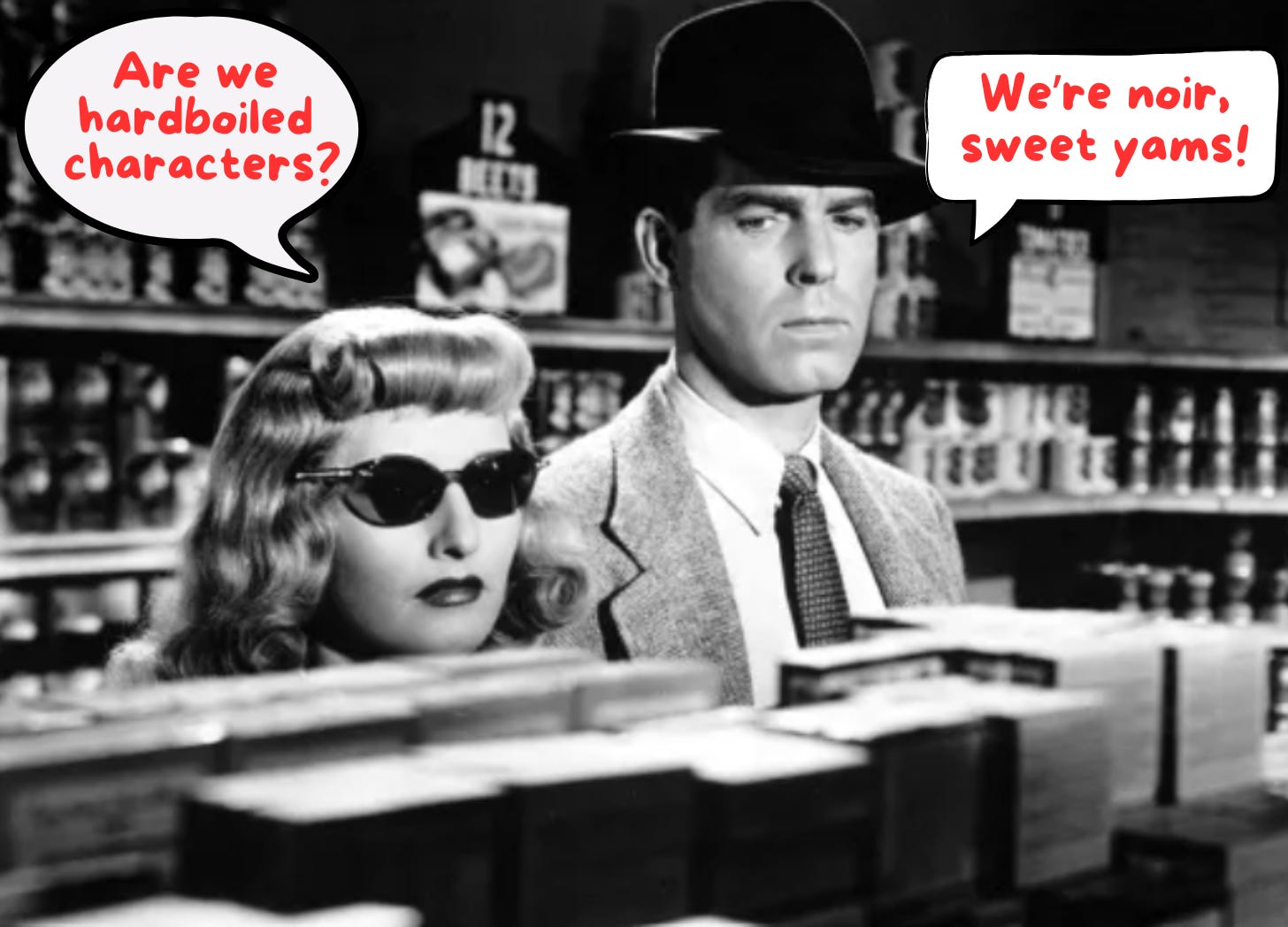Hardboiled and Noir Are Not the Same
Become the classic crime fiction snob you've always aspired to be!
In the world of crime fiction, the terms noir and hardboiled often get thrown around interchangeably. I do it myself sometimes, probably causing unfair confusion. Both conjure images of cigarette smoke, rainy streets, and morally compromised characters. But while the genres may overlap in dark tone, they’re not the same. Understanding the difference sharpens a reader’s appreciation of each. It also will make you sound like a literary scholar at cocktail parties, or a condescending douchebag, depending on what type of party it is.
Hardboiled fiction came first. That much is clear. It emerged in the 1920s and 1930s through American pulp magazines like Black Mask. Writers like Dashiell Hammett, Raymond Chandler, and Carroll John Daly wrote gritty detective stories rooted in realism and American individualism. Private eyes like Sam Spade or Philip Marlowe, the protagonists, sometimes bent the rules, but they maintained a code. The world was corrupt, sure, but the protagonist stood firm, sometimes alone, against it.
Legendary mystery and crime editor Otto Penzler explains:
“In hard-boiled fiction, the detective is the moral center. He may be flawed, but he’s tougher than the world around him, and he doesn’t fall. In noir, the protagonist is doomed from the start.”
That’s the key distinction.
Noir fiction shifts the focus away from the detective and onto the doomed. The protagonist is usually a criminal, a loser, or an average person making a fatal decision. Noir doesn’t just depict crime but shows the descent. In short, noir is more of a voyeuristic peek into one man making a shitshow of his life. As crime writer Megan Abbott1 notes:
“Noir is about people who know they’re going to make the wrong choice and do it anyway.”
Being a “biased” Christian, of the infamously guilt-ridden Catholic variety, I’ve long defended lurid noir tales as mere retellings of humanity’s fall in Genesis. As Abbott (sort of) notes, the troubled characters know they’re tending towards mortal sin, yet they bite the juicy apple anyway. The Forbidden Fruit is a bank vault, a sexy dame, or a fat insurance fraud payoff.
The term noir itself (French for “black”—can you believe I flunked French twice in high school?) actually originated with film, not fiction. In the 1940s and ’50s, French critics used film noir to describe moody American crime dramas like Double Indemnity, The Postman Always Rings Twice, and Out of the Past. These films were often based on novels by authors like James M. Cain, Cornell Woolrich, and David Goodis. They weren’t about solving crimes. They were about falling into them. The darkness wasn’t just around the characters; it was inside them. It wasn’t all dark, shadowy film lighting setups, it was a depiction of dark, shadow souls on the silver screen.
Over time, the term noir came to be applied retroactively to fiction as well. The lines blurred. A Chandler novel might have a noir tone, but it’s hardboiled in structure. A Cain novel, on the other hand, is pure noir. He wrote about ordinary men, femme fatales, and fatal mistakes.
Okay, class, here is a handy list of further reading:
Examples:
Hardboiled:
The Maltese Falcon by Dashiell Hammett
The Big Sleep by Raymond Chandler
The Moving Target by Ross Macdonald
Noir:
Double Indemnity by James M. Cain
Black Friday by David Goodis
Kiss Tomorrow Goodbye by Horace McCoy
The confusion between the two genres is understandable. They share a setting: urban, cynical, violent. They often share a voice: tough, clipped, unsentimental. But hardboiled fiction still believes in the possibility of order. Noir knows only chaos and consequence.
To put it simply:
Hardboiled stories are about fighting the darkness. Noir stories are about being swallowed by it.
Both remain essential reading. Just know which kind of fall you’re in for. And, yes, there will be a test on this topic by the end of the semester.
I quote or mention Abbott so much on this Substack, I feel like she’s due for her own featured post if not a podcast episode. She’s a phenomenal writer even if I disagree with her feminism. What do you think I should do?






That's a better, and sharper distinction between the two then I've seen before. I knew that hard boiled typically referred to the written works, and Noir to the film, but had not really seen the division between the tarnished knight detective and Double Indemnity-style doomed everyman elucidated before.
I was under the impression “noir” came from “roman noir” from the “serie noir” which was then later applied to films with similar themes.